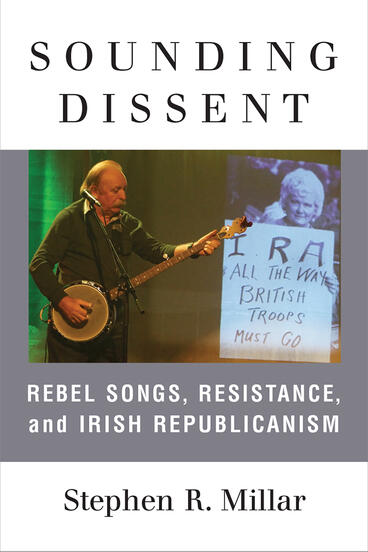Sounding Dissent
Rebel Songs, Resistance, and Irish Republicanism
In Belfast’s rebel music scene, Irish republican musicians and audiences engage in ritualized resistance against the British state
Description
The signing of the Good Friday Agreement on April 10, 1998, marked the beginning of a new era of peace and stability in Northern Ireland. As the public overwhelmingly rejected a return to the violence of the Troubles, loyalist and republican groups sought other outlets to continue their struggle. Music, which has long been used to celebrate cultural identity in the North of Ireland, became a key means of facilitating the continuation of pre-Agreement identity narratives in a “post-conflict” era.
Sounding Dissent draws on three years of sustained fieldwork within Belfast's rebel music scene, in-depth interviews with republican musicians, contemporary audiences, and former paramilitaries, as well as diverse historical and archival material, including songbooks, prison records, and newspaper articles, to understand the history of political violence in Ireland.The book examines the potential of rebel songs to memorialize a pantheon of republican martyrs, and demonstrates how musical performance and political song not only articulate experiences and memories of oppression and violence, but also play a central role in the reproduction of conflict and exclusion in times of peace.
Stephen R. Millar is Lecturer in Anthropology and Ethnomusicology at Queen’s University Belfast.
Reviews
“Sets the standard for oral historians of Northern Irish political culture.”
- Irish Historical Studies
—Irish Historical Studies
"A welcome ameliorative to the dearth of attention that rebel songs have received over the years . . . Millar gives excellent insights into the development and influences on the contemporary canon of rebel songs . . . the deep dive into rebel subculture in Belfast in this study is one of its many strengths."
- Irish Political Studies
—Irish Political Studies
"Millar’s rich and evocative study will enlighten readers interested in Irish history, memory politics and ethnomusicology. It illustrates that the Irish republican movement has by no means run out of cultural resources to exploit.”
- Stephen Hopkins
—Cercles
"Millar makes a significant contribution to the broader understanding of the place of song in situations of revolution and political/republican struggle. A signal addition to the history and historiography of Ireland."
- Martin Stokes
—Martin Stokes, author of The Republic of Love: Cultural Intimacy in Turkish Popular Music
“Millar’s book challenges those of us involved in Irish Studies to engage more—both empathetically and critically—with the cultural histories, perspectives, and practices of those within marginalized and, in some cases, ostracized communities. A fascinating read.”
- John O’Flynn
—John O’Flynn, author of The Irishness of Irish Music
High Commendation: British Association for Irish Studies (BAIS) 2021 Book Prize
- BAIS Book Prize
"Excellent and original work. . . . the depth of primary research and the evidence of immersion in a closed world give this book an attractive energy and focus.”
- Stan Erraught
—Popular Music and Society
“a fascinating case study in overt resistance to the state through music . . . This ethnography will be of interest to anyone exploring music, resistance, nationalism, or commemoration and identity construction more broadly and issues relating to music in post-conflict societies more specifically.”
- Journal of the Royal Anthropological Institute
—Journal of the Royal Anthropological Institute
"a fascinating study of the trajectory of Irish rebel music . . . it usefully highlights how the Irish rebel music scene has become another arena for articulating and expressing differences among the wider Irish republican constituency . . . Millar’s book creates the space for a more nuanced discussion around the growing popularity of Irish rebel music in a post-GFA context.”
- Oral History
—Oral History
“The author brings a wealth of detail and insight into the roles played by music and conflict in recent Irish history, in a manner that is suitable for a broader audience, whilst also informing the sub-field of ‘ethnomusicology in times of trouble’. . . . every university library needs a copy.”
- Patrick Egan
—Ethnomusicology Forum
"If one of the book’s aims might be to illuminate how Irish music and politics are continuously connected, then the book has achieved this goal tenfold . . . essential reading for any ethnographers working in such an environment."
- Áine Mangaoang
—Popular Music
"A hugely valuable book for its revelatory research into rebel songs [and] a valuable contribution to the burgeoning literature on the use of music in conflict situations."
- Adrian Scahill
—Ethnomusicology Ireland
“A fascinating, wide-ranging, and many-layered account of a major subject.”
- Richard English
—Richard English, author of Armed Struggle: The History of the IRA

